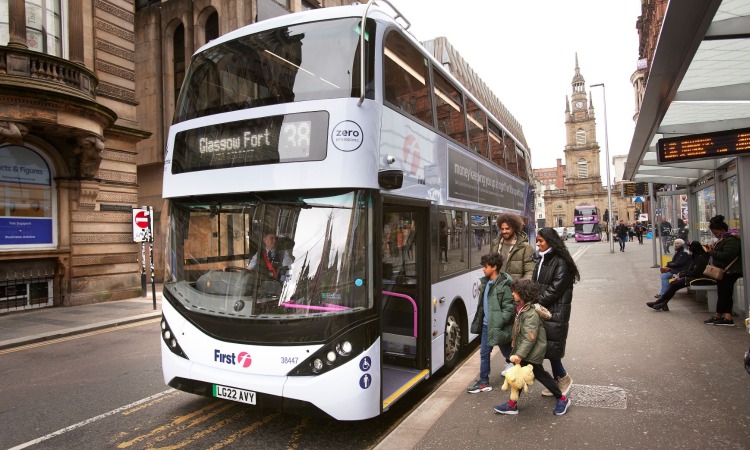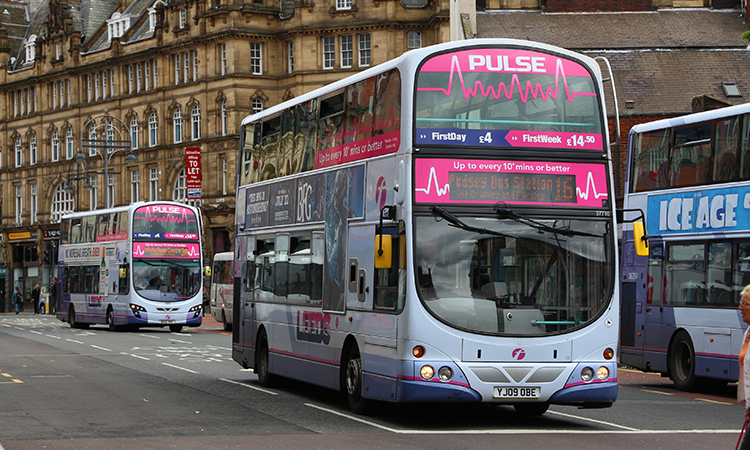The role of bus amidst a cost-of-living crisis
- Like
- Digg
- Del
- Tumblr
- VKontakte
- Buffer
- Love This
- Odnoklassniki
- Meneame
- Blogger
- Amazon
- Yahoo Mail
- Gmail
- AOL
- Newsvine
- HackerNews
- Evernote
- MySpace
- Mail.ru
- Viadeo
- Line
- Comments
- Yummly
- SMS
- Viber
- Telegram
- Subscribe
- Skype
- Facebook Messenger
- Kakao
- LiveJournal
- Yammer
- Edgar
- Fintel
- Mix
- Instapaper
- Copy Link
Posted: 30 January 2023 | Simon Pearson - First Bus | No comments yet
For Intelligent Transport, Simon Pearson, Chief Commercial Officer at First Bus, comments on the cost-of-living crisis, discussing the impact on bus travel and how new technology plays a crucial role in supporting customers during such a difficult time.


Credit: First Bus
Recently, First Bus conducted a survey of 2,500 people to learn more about the impact of the cost-of-living crisis on the general public across the UK. The data, which provides a snapshot view of how rising costs are driving transport decisions, was commissioned to highlight the benefits of bus travel at a time where 23% of people admitted that they are preparing for a recession and are looking for simple ways to save money.
The data… was commissioned to highlight the benefits of bus travel at a time where 23% of people admitted that they are preparing for a recession and are looking for simple ways to save money”
As one of the largest bus operators in the UK, we service customers across the country from a variety of backgrounds, but we are mindful that, as the cost-of-living crisis begins to take its toll on household incomes, we will need a robust plan in place to meet demand and support those who need it most. Customer centricity is an integral part of our values, and something that we often reference in our internal and external messaging. This is more than just a ‘buzzword’ for us, and so it is incredibly important to do what we can to help our customers, and the communities that we serve, during these challenging times. Several initiatives and strategies are already in place or in motion, such as Tap On-Tap Off technology, but we are also looking ahead and considering how we can continue to use our role as a leading transport operator to support people in need.
Economic benefits and changing attitudes of choosing bus
Among the many factors that contribute to modal shift, rising fuel prices has been one of the most significant in recent months. For many people across the country, we’ve seen that attitudes towards private travel have begun to shift, as cost is at the forefront of decision making. The public transport sector has long promoted the economic benefits of switching from car, but, now more than ever, this message rings true. We know from our recent research that almost half of Brits are set to switch to bus as the cost-of-living crisis begins to bite, demonstrating that consumers see bus as a cost-saving option.
We know from our recent research that almost half of Brits are set to switch to bus as the cost-of-living crisis begins to bite, demonstrating that consumers see bus as a cost-saving option”
It’s positive that people have recognised that taking the bus can support family budgets as more and more people consider cost saving measures. The steps that we have made, from implementing and regularly developing the app to adopting electric and hydrogen vehicles into our network, means that bus has evolved and changed for the better. It’s worlds apart from the stereotypes of legacy bus travel and will only get better still, as the technology around real-time data and up-to-the-minute information continues to mature.


Using data and technology
As technology in the travel sector continues to develop at great pace, we’re keen to further integrate data into our processes and make being an insight-led service at the heart of what we do. Thanks to new technology, we’re now able to collect route history and traffic tracking information, while advanced ticketing machines can capture location and trip data. Using this rich data, we can then optimise services and pricing platforms to better suit customers based on their needs. Our own desire to make payment easier for our customers aligns with the UK Government’s ambition for bus fares and ticketing to be made simpler, more affordable and more accessible, as outlined in the National Bus Strategy. Our shared vision for bus has allowed us to utilise the Department for Transport’s (DfT) Transforming Cities Fund to invest in technology that meets all of these needs, namely Tap On-Tap Off.
I believe that investing in these technologies is the best way that First Bus… can optimise [our] services and pricing systems, giving [us] opportunities to offer customers personalised pricing and lower costs for important journeys”
We’ve recently completed the largest roll-out of Tap On-Tap Off technology outside of London and, as part of this, have been concentrating on value for the less frequent traveller through the roll-out of new ticketing technologies, with single fares costing as little as £1.40 when purchased via Tap On-Tap Off. This payment option gives customers a personalised cost, paying only for what they travel rather than a standardised flat fare. Our ticket offers are also constantly being tailored to meet the needs of changing travel patterns – from offering cheaper fares after 19:00 on our Fortnight services, to shuttles that take customers to and from concerts, festivals and stadium events across all of our regions.
All of these changes are tailored to the areas that they are in, based on demand, and developed through conversations with local transport authorities and regional organisations and businesses. I believe that investing in these technologies is the best way that First Bus and other public transport operators can optimise their services and pricing systems, giving them opportunities to offer customers personalised pricing and lower costs for important journeys.


Credit: First Bus Potteries
Looking ahead
There is no doubt that larger proportions of the population will be reconsidering their usual modes of transport, whether that’s a total switch or using public transport when commuting into the office a couple of days a week, as the option of private travel becomes more costly.
As the cost-of-living crisis shows no signs of easing, our sustained investment in technology across the UK, and our ongoing collaboration with local authorities to implement new technology, has played a vital part in lowering the cost of taking the bus for many people”
As the cost-of-living crisis shows no signs of easing, our sustained investment in technology across the UK, and our ongoing collaboration with local authorities to implement new technology, has played a vital part in lowering the cost of taking the bus for many people.
Improving the bus ticketing proposition is a priority and, as we work to enact Bus Service Improvement Plans (BSIPs) around the country, we will continue exploring opportunities to launch Tap On-Tap off and similar schemes in other areas, so that more customers can experience the best journeys for the best value fare. On top of this, as a business, we are always working to change the public perception of bus, proving that it is a reliable and cost-effective way to travel.


Having joined the company in 2011 as Commercial Director for the North of England, Simon has covered many commercial roles in the business and was most recently Commercial Development Director, leading the development of First Bus’s digital and customer transformation.
Simon sits on the First Bus Executive and leads a central team responsible for the development of the overall commercial and customer strategy, including pricing, marketing, network optimisation and digital & retail development. He’s also responsible for First Bus’s customer centricity strategy, focused on using data and insight to deliver an optimised customer offer.
He also ensures that the diverse commercial teams across First Bus’s six business units are delivering the commercial strategy locally, and sharing best practice.
Prior to joining First Bus, Simon spent 12 years in rail in various commercial roles at GNER, National Express East Coast and East Coast Trains. He led the introduction of automated revenue management in the rail sector and led a channel shift programme that significantly increased the number of rail tickets bought online.
Related topics
Accessibility, Passenger Experience, Public Transport, Ticketing & Payments
Related modes
Bus & Coach
Related countries
United Kingdom
Related organisations
Department for Transport (DfT), First Bus, UK Government
Related people
Simon Pearson








